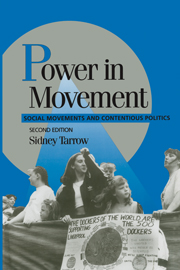Book contents
- Frontmatter
- Contents
- List of Figures
- Preface
- Acknowledgments
- Introduction
- 1 Contentious Politics and Social Movements
- PART 1 THE BIRTH OF THE MODERN SOCIAL MOVEMENT
- PART II FROM CONTENTION TO SOCIAL MOVEMENTS
- PART III THE DYNAMICS OF MOVEMENT
- 9 Cycles of Contention
- 10 Struggling to Reform
- 11 Transnational Contention
- Conclusion: The Future of Social Movements
- Notes
- Sources
- Index
- CAMBRIDGE STUDIES IN COMPARATIVE POLITICS
11 - Transnational Contention
Published online by Cambridge University Press: 05 June 2012
- Frontmatter
- Contents
- List of Figures
- Preface
- Acknowledgments
- Introduction
- 1 Contentious Politics and Social Movements
- PART 1 THE BIRTH OF THE MODERN SOCIAL MOVEMENT
- PART II FROM CONTENTION TO SOCIAL MOVEMENTS
- PART III THE DYNAMICS OF MOVEMENT
- 9 Cycles of Contention
- 10 Struggling to Reform
- 11 Transnational Contention
- Conclusion: The Future of Social Movements
- Notes
- Sources
- Index
- CAMBRIDGE STUDIES IN COMPARATIVE POLITICS
Summary
On February 27, 1997, Louis Schweitzer, president of the ailing French auto firm Renault, announced the imminent closure of the company's plant in Vilvoorde, Belgium (Le Soir, February 28, 1997). The first angry reaction to Renault's announcement came from Belgian prime minister, Jean-Luc Dehaene, and gave rise to accusations in the Flemish press of French “chauvinism” (Le Monde, March 5, 1997). Belgian ire rose when it became clear that the French government had been apprised of Renault's plan at least six weeks prior to its announcement and that the firm was hoping to use European Union (EU) strucrural funds to expand its plant in Valladolid, Spain, just as it closed Vilvoorde (Le Monde, March 6 and 8, 1997). The European Parliament expressed outrage at what some of its members called an “Anglo-Saxon” restructuring; even normally deadpan Commission President Jacques Santer called the decision “a serious blow to European confidence,” urging the automaker's Belgian workers to sue the company for violating European labor law (International Herald Tribune, March 10, 1997). The unions promptly took the firm to court, both in Belgium and, for good measure, in France.
But if Belgian and EU officials were ruffled by Renault's move, that was nothing compared with the reactions of Vilvoorde's workers. Almost immediately following the announcement of the closure, they occupied the plant, “kidnapped” a large number of cars due for shipment, and began a series of public protests that would make Vilvoorde synonymous with a new term in the European political lexicon – “the Eurostrike.”
Information
- Type
- Chapter
- Information
- Power in MovementSocial Movements and Contentious Politics, pp. 176 - 195Publisher: Cambridge University PressPrint publication year: 1998
Accessibility standard: Unknown
Why this information is here
This section outlines the accessibility features of this content - including support for screen readers, full keyboard navigation and high-contrast display options. This may not be relevant for you.Accessibility Information
- 1
- Cited by
